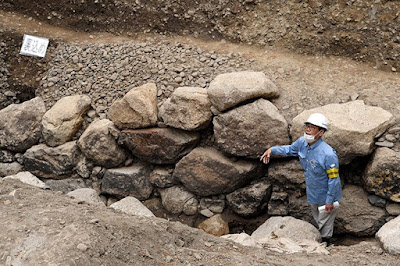Kyoto Shinjo Castle was constructed in 1597 by samurai warlord Toyotomi Hideyoshi (1537-1598), one of the three great unifiers of Japan. It was the last castle he built before his death in 1598.
Researchers conducting excavation work unearthed stones walls and a moat belonging to the castle on the grounds of the Kyoto Sento Imperial Palace on May 12.
The castle was known to have existed due to it being mentioned in written documents, but no physical trace of it had been found until now. The techniques used to construct the castle wall will provide some good insight into the Azuchi-Momoyama Period (1568-1600) of Japanese castles.
 |
| Excavated stones walls from Kyoto Shinjo | Image: The Mainichi |
Kyoto Shinjo Castle was destroyed in 1600 just before the greatest samurai battle in history at Sekigahara, which decided that fate of Japan for the next 260 years. Kyoto Sento Imperial Palace was constructed over its remains in 1627 as the retirement home for Emperor Go Mizuno after his abdication.
 |
| Stone wall at Kyoto Shinjo Castle | Image: The Asahi Shimbun |
The castle was built close to the Imperial Palace to cement the Toyotomi court rank of Chancellor of the Realm and Imperial Regent “kanpaku” (chief advisor to the emperor). Hideyoshi ruled Japan in all but name and most likely built the castle, so that his infant son, Hideyori (1593-1615) could succeed his titles upon his death.
Hideyoshi was worried about other daimyo (feudal lords), especially Tokugawa Ieyasu (1543-1616) gaining control of the country after his death.
It will be interesting to see what they decide to do with this amazing new discovery.
 |
| Screen Painting of Kyoto Shinjo Castle | Image: The Asahi Shimbun |

